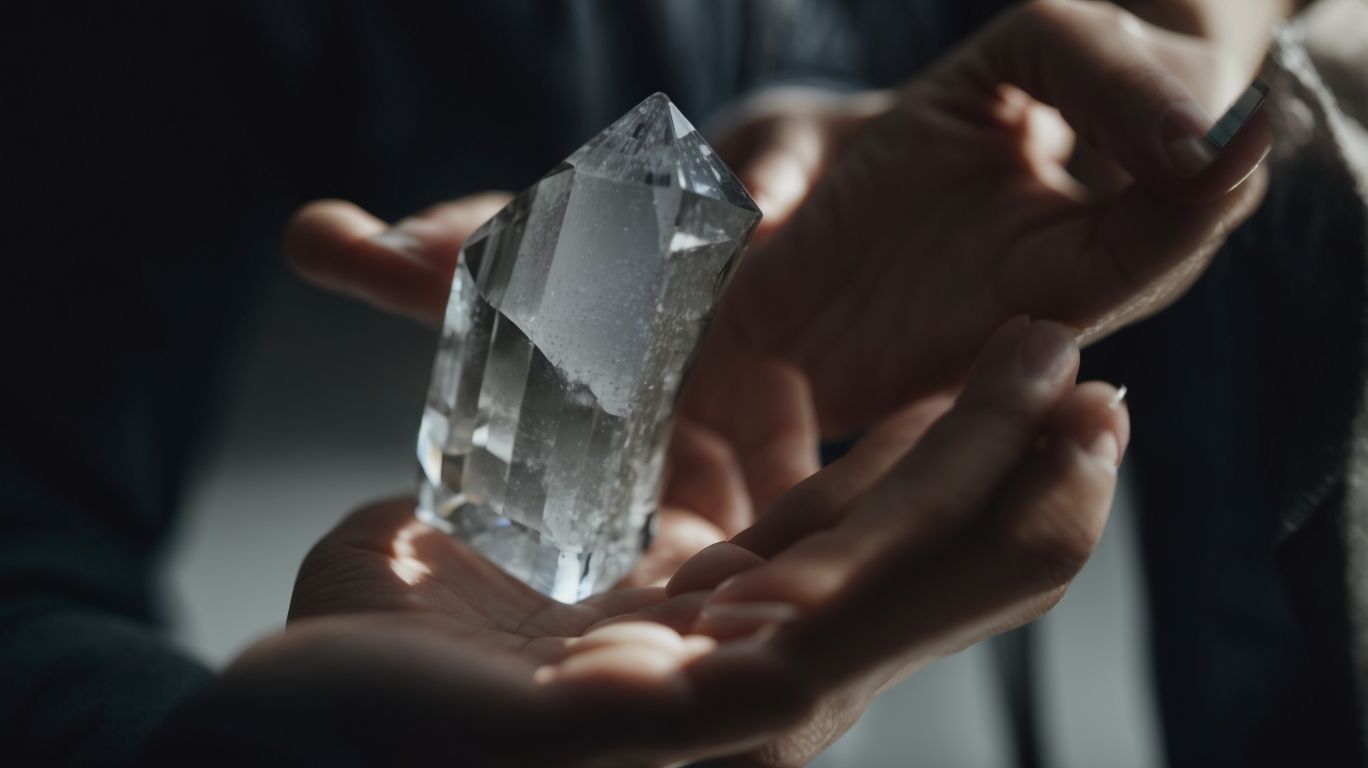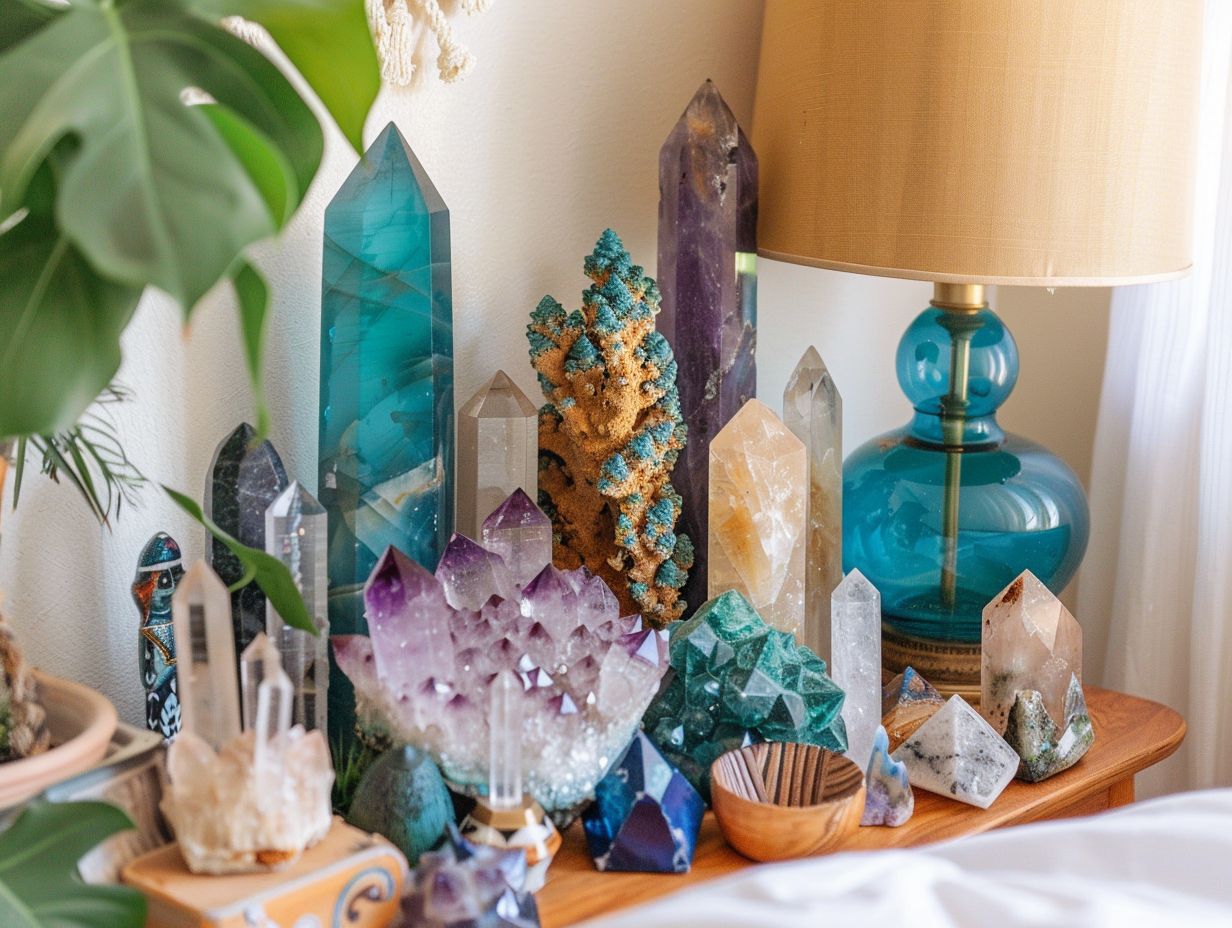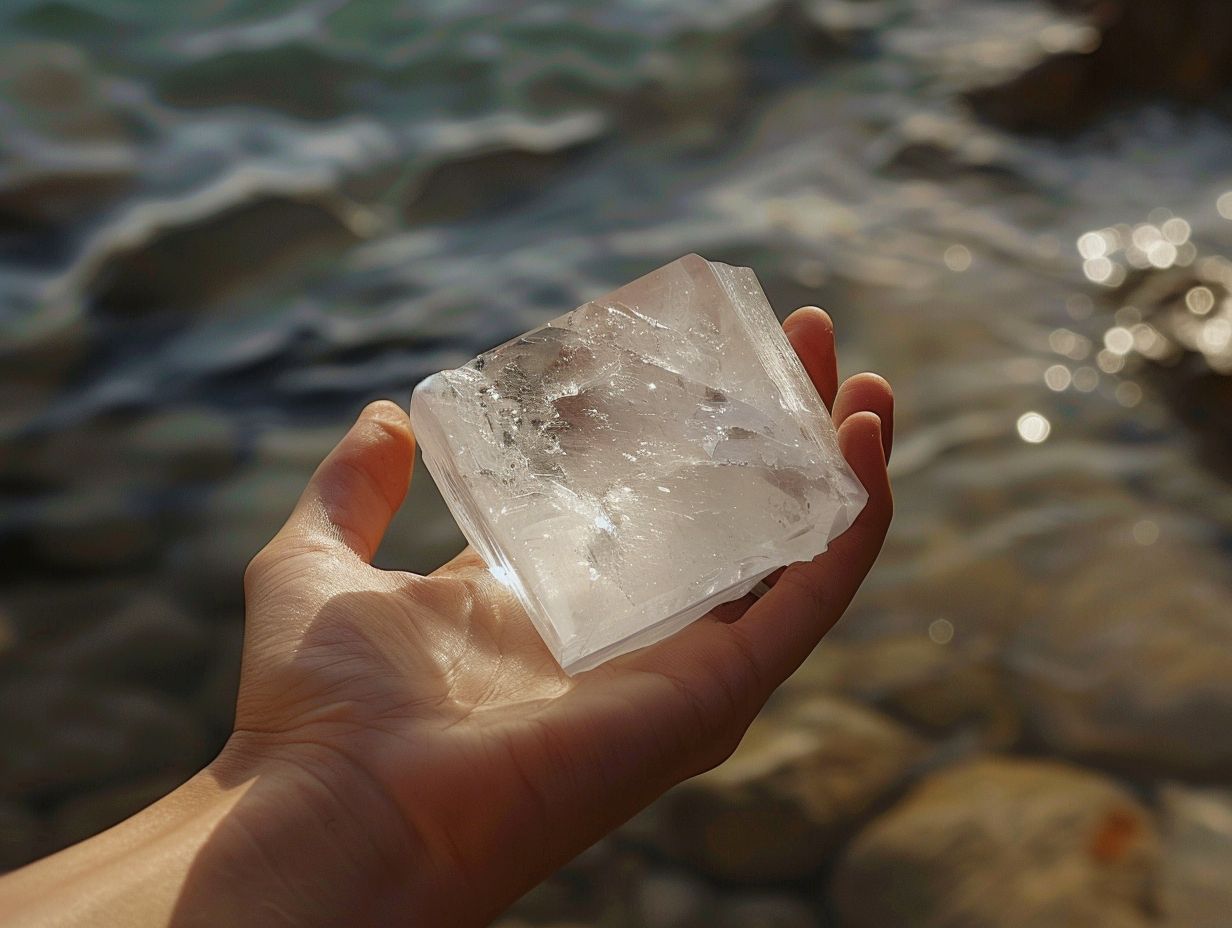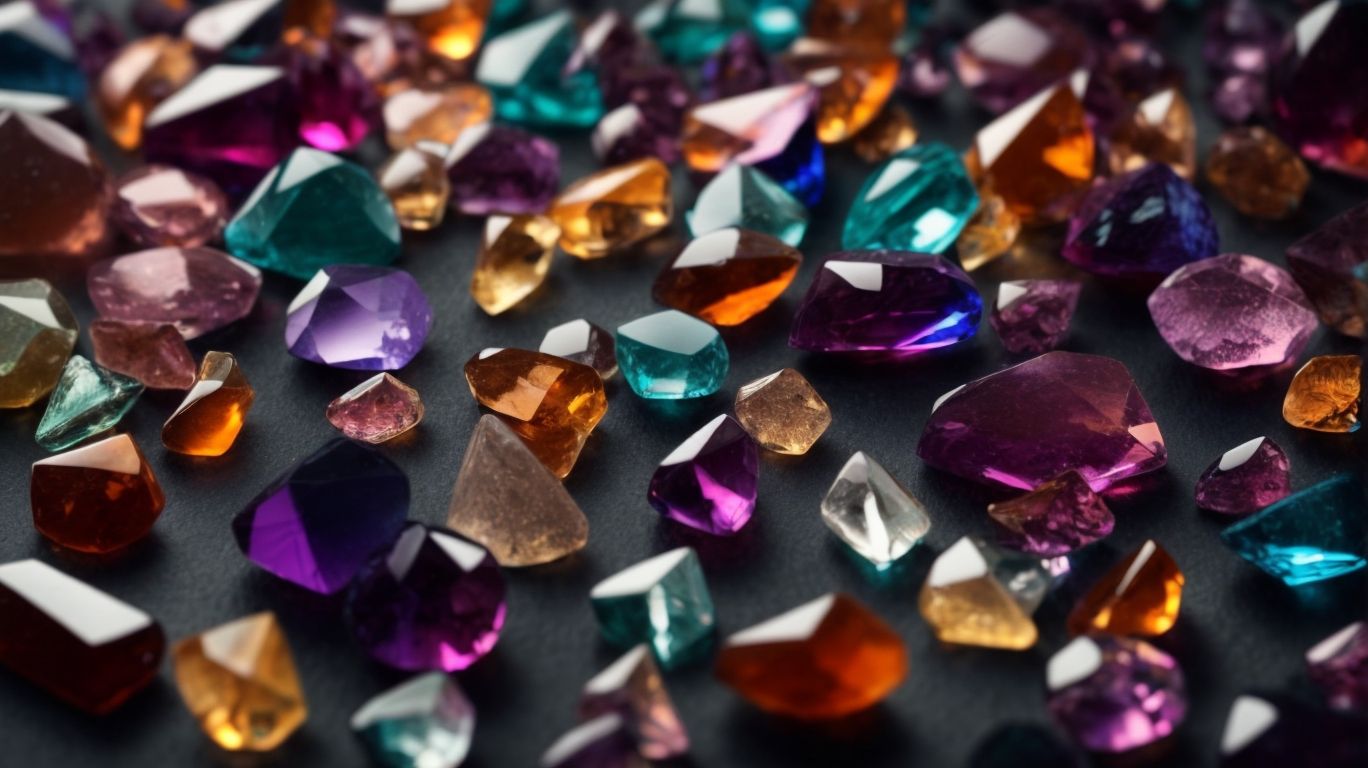
Eco-Conscious Healing: Sourcing Large Crystals Responsibly
Are you a fan of large crystals and their healing properties? Consider where these crystals come from and how they are sourced.
We explore what large crystals are, the most popular types, and why it is crucial to source them responsibly. We will also discuss the environmental and social impacts of irresponsible sourcing, how to identify ethically sourced crystals, and alternative options to consider.
Delve into the world of eco-conscious healing and learn how you can support responsible sourcing practices.
What Are Large Crystals?
Large crystals are natural formations of minerals that have grown over an extended period, often prized for their size, beauty, and metaphysical properties.
These magnificent crystals are created through a process called crystallization, where atoms and molecules align in repeating patterns to form solid structures. When these formations grow undisturbed for a prolonged period, they can develop into sizable specimens that captivate observers with their intricate geometric shapes and vibrant colors.
Many individuals believe that these large crystals hold unique energies that can aid in spiritual healing and balance. In practices like crystal healing, these crystals are used to harness positive vibrations and create a harmonious connection with nature’s energy.”
What Are The Most Popular Large Crystals?
The most popular large crystals include quartz, amethyst, citrine, and rose quartz, each renowned for its unique healing properties and ability to enhance the mind-body connection.
- Quartz, known as the master healer, amplifies energy and is essential for energy cleansing and chakra healing.
- Amethyst, with its calming energy, aids in spiritual awareness and sobriety.
- Citrine, the stone of abundance, boosts confidence and creativity while attracting prosperity.
- Rose quartz, the stone of unconditional love, promotes compassion and self-love.
These crystals are commonly used in meditation to deepen the spiritual experience and cultivate inner peace. By placing them on specific chakras during meditation or carrying them in your pocket, you can benefit from their harmonizing and grounding effects.
Why Is It Important To Source Large Crystals Responsibly?
It is crucial to source large crystals responsibly to ensure ethical practices, minimize environmental impact, and support sustainable mineral extraction for the well-being of the planet and future generations.
By emphasizing ethical sourcing in the crystal industry, we can enhance the transparency of supply chains, promote fair trade practices, and encourage eco-friendly mining methods.
Transparent supply chains enable consumers to trace the journey of each crystal, ensuring it was sourced ethically and sustainably. Fair trade practices not only safeguard the rights of miners but also ensure they receive fair compensation for their labor.
Embracing eco-friendly mining methods helps reduce harmful environmental effects and preserves the natural beauty of the Earth for conscious consumerism and eco-conscious living.
What Are The Environmental Impacts Of Irresponsible Sourcing?
Irresponsible sourcing of large crystals through unsustainable crystal mining practices can lead to devastating environmental impacts, including deforestation, habitat destruction, soil erosion, and depletion of natural resources.
Such actions can also result in severe water pollution, as toxic chemicals used in the mining process can leach into nearby water sources, contaminating aquatic ecosystems and impacting the health of both wildlife and humans. Land degradation caused by irresponsible mining practices can disrupt delicate ecological balance, leading to a loss of biodiversity and further exacerbating the effects of climate change. It is crucial to prioritize sustainable practices in crystal mining to preserve our planet’s ecosystems and conserve its natural resources for future generations.
What Are The Social Impacts Of Irresponsible Sourcing?
Irresponsible sourcing of large crystals can have negative social impacts, including exploitation of workers, violation of human rights, and disregard for fair trade practices, undermining the principles of ethical consumption and responsible business conduct.
This is particularly concerning as it perpetuates a cycle of poverty in communities where these crystals are mined, often leading to unsafe working conditions and inadequate wages for laborers. The lack of fair trade certifications not only compromises the welfare of those involved in the sourcing process but also affects the overall community well-being. By supporting brands that prioritize ethical practices and uphold fair trade standards, consumers can play a pivotal role in encouraging responsible sourcing and advocating for transparency and equity in the crystal industry.
How Can You Tell If A Large Crystal Is Sourced Responsibly?
Identifying responsibly sourced large crystals involves looking for certifications, verifying the supply chain transparency, and asking sellers specific questions about their sourcing practices to ensure ethical standards are met.
- Certifications such as Fairtrade, ethical mining certifications, and sustainable sourcing labels play a crucial role in determining the ethicality of crystals. These certifications indicate that the crystals have been sourced in a socially and environmentally responsible manner.
When purchasing large crystals, it’s important for consumers to inquire about the origin and journey of the crystals. By doing so, individuals can support transparent and responsible practices within the crystal industry, promoting sustainability and ethical sourcing.
What Certifications Should You Look For?
When seeking responsibly sourced large crystals, look for certifications such as Fairtrade, Ethical Mining Certifications, and labels indicating eco-friendly packaging, ensuring that the crystals are sourced and processed in an ethical and environmentally conscious manner.
These certifications play a vital role in guaranteeing that the crystals have been sourced in ways that support fair treatment of workers, responsible mining practices, and sustainable packaging techniques. For instance, Fairtrade certification ensures that miners receive fair wages and work in safe conditions, while Ethical Mining Certifications focus on minimizing environmental impact and promoting community development. Labels indicating eco-friendly packaging signify a commitment to reducing waste and utilizing materials that are less harmful to the environment, influencing the overall sustainability of the crystal industry.
What Questions Should You Ask The Seller?
When purchasing large crystals, inquire about the crystal’s origin, mining practices, ethical sourcing methods, and the seller’s commitment to transparent supply chains, aligning your purchase with principles of conscious consumerism and ethical consumption.
In ensuring the ethical sourcing of large crystals, it’s crucial to ask sellers key questions that shed light on their labor conditions, environmental impact, community engagement, and dedication to sustainability. By delving into these crucial aspects, buyers can make informed decisions and encourage responsible practices within the crystal industry.
Asking sellers about fair wages, safe working conditions, eco-friendly mining techniques, community empowerment initiatives, and their efforts towards sustainability fosters a culture of accountability and transparency. Supporting businesses that prioritize ethical values not only benefits the environment but also promotes positive change in the industry.
What Are The Alternatives To Large Crystals?
In addition to large crystals, alternatives include small crystals, reclaimed crystals sourced from vintage pieces, and man-made crystals crafted through sustainable processes, offering diverse options for individuals seeking holistic healing and spiritual connection.
Small crystals, such as tumbled stones or miniature clusters, are favored for their portability and versatility, making them ideal for carrying in pockets or creating intricate jewelry pieces.
Reclaimed crystals, with their rich history and unique energy, promote the concept of recycling in the spiritual realm, encouraging a sense of renewal and sustainability.
Man-made crystals, like aura quartz or lab-grown diamonds, provide ethically sourced options that align with conscious living principles and support ethical practices within the crystal industry, resonating with those who value transparency and eco-consciousness.
Small Crystals
Small crystals serve as powerful tools for energy cleansing, aura cleansing, and vibrational healing, offering a portable and versatile option for maintaining positive energy and spiritual well-being.
These tiny gems are not only aesthetically pleasing but also carry immense metaphysical properties that can be utilized in various spiritual practices. Small crystals are known to help amplify intentions during meditation, as their energy can be felt more intensely due to their size. They are often used in chakra healing to balance and activate energy centers within the body, promoting overall harmony and well-being.
Popular small crystals like amethyst, clear quartz, and rose quartz are highly regarded for their calming, purifying, and loving energies, making them ideal companions for anyone seeking to enhance their spiritual journey.
Reclaimed Crystals
Reclaimed crystals offer a sustainable and eco-conscious option for individuals seeking crystals with a history, promoting a deeper connection to nature and supporting earth-friendly practices through recycling and repurposing.
These unique crystal specimens, each with a story to tell, not only add a touch of natural beauty to our surroundings but also serve as a reminder of the importance of honoring the energy of the earth.
By incorporating these reclaimed crystals into holistic practices, individuals can not only benefit from their healing properties but also contribute to a more sustainable way of living.
These crystals carry with them a sense of history and positive energy, making them a powerful tool for personal growth and environmental stewardship.
Man-Made Crystals
Man-made crystals are crafted using renewable resources and eco-friendly practices, offering a sustainable alternative to naturally occurring crystals while promoting ethical consumption and supporting sustainable initiatives.
These man-made crystals are produced through a meticulous process that involves carefully selected raw materials, innovative technologies, and energy-efficient methods. By sourcing materials that are easily replenished and reducing the need for traditional mining practices, the production of man-made crystals significantly minimizes its environmental footprint. This approach not only benefits the planet by preserving natural resources and reducing pollution but also aligns with the principles of conscious living and environmental stewardship. Choosing man-made crystals can thus be a meaningful way to support sustainable practices and make a positive impact on the Earth.
How Can You Support Responsible Sourcing Of Large Crystals?
Supporting responsible sourcing of large crystals involves choosing ethical brands, spreading awareness about sustainable practices, and prioritizing local and small businesses that uphold transparent and eco-conscious values.
One actionable step consumers can take to promote responsible crystal sourcing is to research and select brands known for their ethical practices and commitment to sustainability. By being intentional with their purchasing decisions, individuals can support companies that prioritize environmental and social responsibility in the sourcing and production of crystals.
Another way to contribute to ethical consumption in the crystal industry is by educating others about the importance of sustainable sourcing methods and the impact of irresponsible practices on the environment and communities. Engaging with local and small businesses that are dedicated to eco-friendly principles can further encourage conscious living and promote ethical consumption within the crystal market.
Support Ethical Brands
By supporting ethical brands that prioritize sustainable practices, transparency, and a connection to nature, consumers can actively promote mindfulness, conscious consumerism, and positive energy within the crystal community.
These ethical brands play a crucial role in shaping the crystal industry towards a more responsible and sustainable future. When consumers choose to align their values with brands that uphold ethical sourcing practices and eco-conscious initiatives, they are contributing to the preservation of the environment and the well-being of communities involved in the supply chain.
By supporting these brands, individuals can harness the healing properties of crystals while also fostering respect for nature and holistic well-being. It is through these conscious choices that consumers can make a positive impact on both the industry and the planet.
Spread Awareness
Spreading awareness about the impact of crystal sourcing, promoting eco-friendly packaging, and advocating for sustainable practices can contribute to a collective shift towards conscious living, environmental stewardship, and spiritual healing through crystal energy.
By understanding the journey of crystals from the earth to the consumer’s hands, individuals can make informed choices that support ethical mining practices and fair labor conditions. Mindful consumption involves appreciating the beauty and energy of crystals while being mindful of their origins and the implications of their extraction.
Encouraging transparency in the supply chain and supporting brands that prioritize sustainability can drive positive change in the crystal industry, promoting a harmonious balance between environmental conservation and spiritual well-being.
Support Local and Small Businesses
Supporting local and small businesses that prioritize fair trade practices, sustainable values, and harmony with nature fosters community engagement, ethical consumption, and a positive impact on both the environment and society.
By choosing to support these businesses, individuals play a crucial role in fostering a sense of interconnectedness within their communities. These businesses often source their crystals ethically, maintaining a transparent supply chain that aligns with conscious consumer values. Through their commitment to fair trade practices, they contribute to the economic stability of local artisans and indigenous communities, ensuring that every purchase positively impacts those involved in the production process.




No Comments